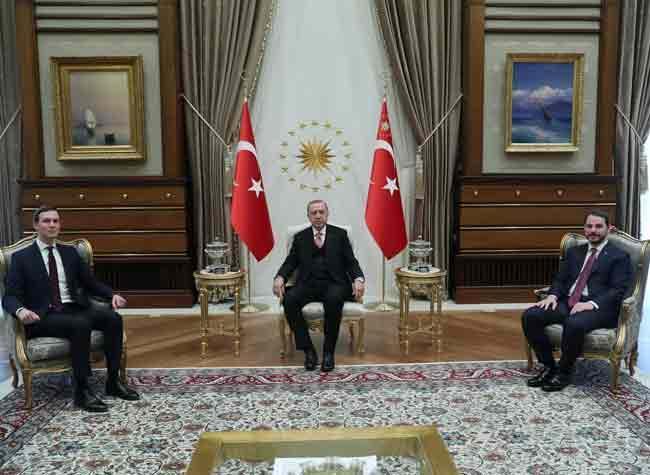
President Recep Tayyip Erdoğan met with U S. President Donald Trump’s senior adviser Jared Kushner on Feb. 27 for talks expected to focus on a U.S. peace plan for the Middle East and economic issues.
Erdoğan, in an interview late on Feb. 26, said Kushner was due in Turkey to discuss “economic and regional issues.”
Kushner, who has responsibility for Washington’s Israel-Palestine policy, embarked on a Middle East tour on Feb. 25 and is accompanied by Trump’s Middle East envoy Jason Greenblatt and U.S. envoy on Iran Brian Hook. The U.S. officials are seeking support for a long-awaited peace proposal for the Israeli-Palestinian conflict. They met with the leaders of the UAE and Oman on Feb. 26.
Kushner has earlier said the plan will address final-status issues of the conflict, including establishing borders. U.S. officials said that Kushner was expected to focus on the economic component of the plan during the week-long trip, according to Reuters.
But in an interview on Feb. 25 on Sky News Arabia, Kushner said that in addition to its economic component, the proposal also contained a “political plan, which is very detailed” and “really about establishing borders and resolving final-status issues.”
Kushner made no specific mention of a Palestinian state, whose creation had been a key goal of Washington’s peace efforts for two decades.
But he said the long-awaited peace proposal would build on “a lot of the efforts in the past,” including the 1990s Oslo accords that provided a foundation for Palestinian statehood, and would require concessions from both sides.
Erdoğan has been one of the most vocal critics of Trump’s support for Israel. Last year he said the United States had forfeited its role as mediator in the Middle East by moving its Israel embassy to Jerusalem and recognizing the city as Israel’s capital.
“The United States has chosen to be part of the problem rather than the solution,” the Turkish president said last May, days before he hosted a summit of Muslim leaders which threatened economic measures against countries which followed the United States in moving their embassies to Jerusalem.
Israel calls all of Jerusalem its “eternal and undivided capital,” a status not recognized internationally. Palestinians want East Jerusalem, captured and occupied by Israel in a 1967 war, as capital of a future state.